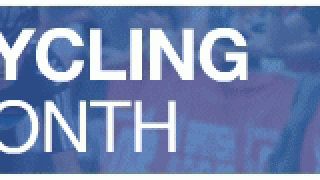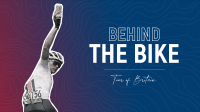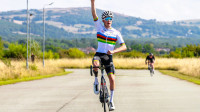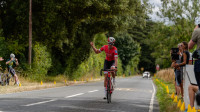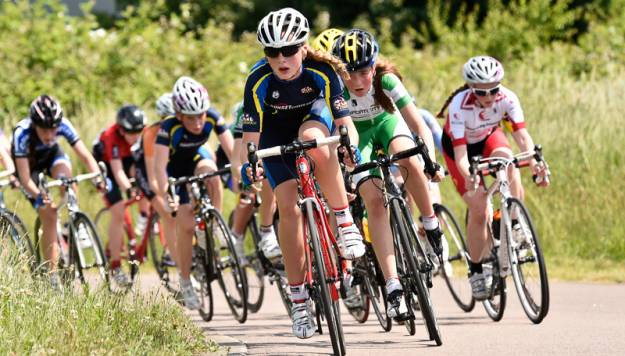Good Luck!
"Good Luck!" Two little words. Ones you hear so often in sport that you can easily take them for granted. Who has not offered a friend or team-mate a pre-event handshake accompanied by this short phrase?
The sentiment is quite simple - you're basically saying "I hope everything goes as planned and that nothing unfortunate befalls you!" There's also a hint that you are saying "I hope you have slightly better luck than your rivals!" In other words, "I hope you win."
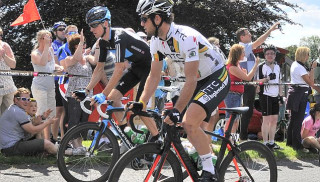
Wiggins and Cavendish, well prepared, but still hoping for a litttle "Good Luck"
It's a morale-booster, a verbal hug, a vocal pat on the back, a quick psychological pep-up, sport's equivalent of the dreaded "Have a nice day!". But, for all that it's a common currency of start line chat the world over, deep down most athletes tend to be wary of the concept of "luck". To accept that luck exists is to accept that uncontrollable variables can interfere in the search for a top performance. Yet accept it they must.
In truth, "Luck" is probably the last thing on the top athlete's mind as he or she prepares meticulously for competition.Training is not necessarily the time to worry about the uncontrollable variables.
And for track riders in particular, uncontrollable variables can be cut to a minimum. In the "against-the-clock" time trials and pursuits there aren't even any fellow competitors to worry about, let alone wind, rain, punctures, stray dogs etc. These riders operate in a relatively sterile environment, not quite hermetically sealed, but certainly one where, a freak mechanical problem apart, very little can go wrong once they have made it safely to the start line.
Move into the bunch races and you crank up the uncontrollable variables considerably: your fellow competitors are on the track with you, crashes become a factor, along with tactics, which are, in effect, deliberately introduced variables - you deploy your tactics to put your opponents at a disadvantage; they deploy theirs to try to do the same to you.
Pop outside the velodrome and onto the road and uncontrollable variables suddenly crowd in from all sides. Road racing is arguably the most uncontrollable and unpredictable of all the cycling disciplines. Even in mountain biking, with its extreme terrain challenges, results are less difficult to call than in most one-day Road races.
A Road rider may be in the form of his or her life, yet get nowhere near winning an event. They can avoid mechanical problems, cope with the weather as well as anyone else, keep on top of their nutrition and re-hydration, yet finish nowhere if they get their tactics wrong, or if the race pans out in a way which doesn't suit their strengths.
The Tour de France is an environment where, on the face of it, luck and those uncontrollable variables seem to have an overwhelming influence. When we look at the Tour, do we take the potential for the unexpected of an average road race and multiply it by twenty-one? Well, yes and no.
Certainly, the opportunities for illness to creep into the equation are significantly greater than in a one-day event. The risks of riding in a big peloton through the vastly varied terrain and climate of France are considerable. We've all read about teams ravaged by viruses and seen the footage of spectacular crashes on the mountains and in the sprint finishes.
But, on the other hand, the sheer length of the event reduces some of the other risks and variables. A lesser rider can't hide his weaknesses for three weeks. Equally, an excellent rider is more than likely to have success, purely because there are so many and so varied opportunities to shine over the 21 days of racing.
Sprinters have a number of stages tailored to their strengths, climbers have mountains to stretch their legs on and, with many riders content to await the opportunities to cash in on their particular strengths and with domestiques occupied with the task of protecting their team leaders, the odds against winning suddenly become more attractive.
When Mark Cavendish lines up a sprint finish on a flat stage, he knows that as long as the stage finishes in a bunch sprint, he really only has perhaps 5 or ten riders to really worry about at the sharp end of the sprint. And, when you're the best sprinter in the world, that's fantastic odds: hence Cavendish's great strike rate in recent Tours.
If you turn to the General Classification (GC) contenders, the odds come down even more. At most there are perhaps ten riders on the start line of the first stage who believe they can win the Tour overall. That number usually drops steadily as the race progresses, with the time trials and the mountain stages weeding out the lesser lights, whilst the genuine contenders shine.
Often by the start of the third week there is a clear favourite - a rider with a two or three minute lead over his rivals - and perhaps only one or two others still close enough on GC to be serious challengers.
So, in some ways, those uncontrollable variables races are actually much less daunting in longer stage races. Luck is still a factor, but small problems like ill-timed punctures, minor tactical errors and even crashes can be overcome and victory still pursued with a real chance of success. Uncontrollable variables, as long as they are relatively minor - and in Road racing most are - are not really race-deciding.
We started by saying that athletes tend to shy away from the concept of luck. But most ultimately accept that they are at the whim of those uncontrollable variables to a greater or lesser extent. What is perhaps most interesting about the concept of luck is an athlete's ability to overcome the "bad " variety. What does that say about him?
There's an oft-quoted line, ascribed to many top sportsmen and women, which goes something like this - "it's funny, the harder I train (or practice) the luckier I get!" This has two equally valid angles to it:, through dint of hard work, I've improved my skill/fitness so that I'm ahead of the opposition to the point where even bad luck can't stop me winning; equally it also suggests the mindset where the individual has such a reservoir of belief and self-confidence that misfortune, in whatever form, can almost be brushed aside.
Athletes train hard to get better at their chosen sport. But they also train hard to build this force-field of confidence and invulnerability around themselves. Their self esteem grows as they get fitter; this in turn helps them to focus on their goals and relax at times when they should be feeling under maximum stress.
Lance Armstrong was a highly-driven individual unlike any we have seen before.
His seven wins in the Tour de France might never be matched and, despite all the controversy and suspicion which has cast a shadow over some of his achievements, he is a great example of an athlete who refused to bow to ill-fortune, not least in overcoming a near fatal encounter with cancer.
Armstong dominated most of the Tours he won, but in 2003 he had a wretched time: illness sapped him of his strength; an accidental tangle with a spectator on the Col du Tourmalet left him lying dazed in the road; his bike jumped out of gear almost as soon as he'd re-mounted it, leaving him freewheeling uphill astride his top tube; he also came perilously close to crashing out of the Tour, narrowly missing the accident in which his rival Belocki skidded and fell on hot tarmac, breaking his pelvis.
Despite these problems Armstrong still won. His self belief remained intact and his superiority such that he still had enough in hand over his main rivals, Mayo and Ullrich. His popularity also spiked as spectators warmed to his fearless response to adversity.
Similarly, the first half of the 2010 Tour saw Mark Cavendish struggling for form. A more emotional and instinctive talent than Armstrong, the Manxman looked unhappy and at times distraught at his failure to turn several excellent opportunities into stage wins. Yet, by the end of the Tour he was streaking away to win the final stage for the second year in a row, his reputation if anything enhanced by his "re-birth" mid Tour.
The 2011 Tour is only a few days old and already "luck" is playing its part and the big names are once again in the spotlight. Cavendish was prevented from winning the third stage due to the congestion in the final corner, whilst Contador suffered the biggest loss of all the leading contenders in the chaos of the closing kilometres of stage one.
Both will once again be forced to call upon those reserves of self-belief and confidence as they try to turn their Tours around. And both will find their legacy as athletes will be as much influenced by their responses to "bad luck" as it will be by their triumphs on days when everything goes for them.
"Luck", whether you accept the concept or not, is a key lens through which many of us judge each other and even the "bad" variety has the power to cast light on the true nature and talents of our fellow human beings. It is also a piquant and chaotic daily visitor into the lives of a group of people who, more than most, like to be in control of their destinies. And that is why, as spectators, we so relish its twists and turns.

